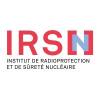Chercheur(Se) en Thermohydraulique, Mécanique Des - Marseille, France - IRSN
Description
Intitulé du poste:
Chercheur(se) en thermohydraulique, mécanique des fluides, thermique H/F
Type de contrat:
Post-doctorat
Statut:
Cadre
Disponibilité du poste:
02/05/2023
Localisation du poste:
Cadarache
Environnement / Organisation / Contexte:
During a hypothetical Loss of Coolant Accident, the fuel rods grouped into assemblies may balloon due to the high temperatures in the core and the differential pressure across the clad of the rods.
Consequently, partial obstruction of the flow channel can jeopardize the cooling capability of the core during the following reflooding phase.
During this phase, water is injected into the core leading to the progression of a quench front. Above this quench front, are located the ballooned hot rods exchanging heat with a steam-droplets flow.To study such configuration, IRSN has developed the DRACCAR software allowing to simulate the thermal-mechanical behavior of a rod assembly during LOCA with a 3D multi-rod description.
At the same time, simulations using the CFD code SATURNE-NEPTUNE have been carried out at a CFD scale to evaluate the wall heat transfer above the quench front.
Due to the lack of experimental data at such scale, tests were performed in the mock-up MASCARA using Reynolds analogy and MRI (magnetic resonance imaging) with the aims to get a fine mapping of the flow velocity.
Mission:
The study can be divided in the main following tasks:1/ CFD Simulation of flow deviation with the SATURNE-NEPTUNE code
CFD calculation of the flow deviation induced by different geometrical and flow-rate configurations will be compared to experimental results in order to better understand the flow just downstream deformed rods, where the deterioration of heat transfer may be critical.
The calculations will be performed under adiabatic conditions.2/ Upscaling model of flow deviation
Cross-flows deduced from CFD in the region downstream deformed rods will be analyzed for prescribing a model for a sub-channel scale analysis in the DRACCAR code.
The implementation of the model will be carried out with the help of the DRACCAR developing team located in the SEMIA department.
3/ CFD simulation of convective heat transferThermal heat transfer between rods and fluid will be studied in order to identify the hot spots within the geometry and to relate their position to the previous hydrodynamics study.
The fluid considered will be steam taking into account its thermal expansion that may induce an additional phenomenology.4/ Upscaling model of single-phase heat transfer
Cross-flows and heat transfer intensity deduced from CFD in the region downstream deformed rods will be analyzed for prescribing models for a sub-channel scale analysis (see task n°2).
5/ Study of other geometriesThe hereinabove studies are limited to a set of configurations of an array of 4x4 rods deformed within a 7x7 rods array.
The ability of modeling the phenomena on a more generic fuel assembly geometry is required to study core geometry.Based on the previous analyzes, recommendation for the design of new experiments or for the performance of additional computations will be made.
This work will be performed in interaction with both the experimental IRSN department SEREX at Cadarache and the LEMTA lab at Lorraine University where the MASCARA experiments have been performed.
6/ Two-phase flow heat transferIn more realistic conditions, droplets flow within superheated steam act as an additional cooling source of the rods.
Previous studies will be complemented by modeling their flow within the geometry based on a Euler-Euler two-phase model with heat and mass transfer thanks to the Neptune-CFD software.
Profil recherché:
Applicant should possess a Ph.
D. degree in CFD and have a good knowledge of turbulence modelling, heat transfer processes and multiphase flow simulation. Knowledge of the C (or FORTRAN) programming language as well as the Unix environment will also be an asset.
Télétravail:
Régulier
Langues:
Anglais (2- Niveau professionnel)
Plus d'emplois de IRSN
-
Ru, Sureté Du Procédé D'extraction Dans Les
Montpellier, France - il y a 1 jour
-
Chargé D'étude en Incendie
Marseille, France - il y a 1 semaine
-
Stage M2- Tests de Performance Des Matrices de
Marseille, France - il y a 1 jour
-
Stage M2-étude Expérimentale échelle Réduite
Marseille, France - il y a 1 semaine
-
Chargé d'affaires contrôles internationaux de non-prolifération nucléaire H/F
Fontenay-aux-Roses, France - il y a 1 semaine
-
Neutronicien - Dévt Instruments de Mesure Détection Risque de Criticité H/F
FONTENAY AUX ROSES, France - il y a 2 semaines

